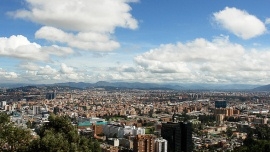Earthquakes, hurricanes, floods and other disasters are natural phenomena, but they include a social dimension as they also affect the poorest or least prepared communities.
Recent events such as the Haiti earthquake of 12 January 2010, Chile’s on 27 February 2010, New Zealand’s on 13 June 2011 and Japan’s on 11 March 2011, as well as the 2010 and 2011 floods in Pakistan, Thailand and Colombia, illustrate the profound effect that this type of events can have on national development plans, as well as the need for countries to adopt and consolidate proactive risk management policies.
Under this scenario, Los Andes University and the World Bank, with support from the Global Facility for Disaster Reduction and Recovery (GFDRR), are publishing the “Probabilistic Modeling for Disaster Risk Management. The Case of Bogota, Colombia.”
The book includes conceptual bases and the use of different risk management evaluation case findings under the framework of socio-economic planning and sustainable development. Special emphasis is made on the seismic theme and the risks derived from floods and slides in cities.
The objective of this publication is to illustrate a series of real cases that have proved useful in the implementation of disaster risk management activities, in order to make the technical community, public officials and decision-makers related to the field aware of the benefits of having access to relevant and appropriate risk evaluation information from a probabilistic perspective.
In this way, using risk evaluations based on real examples undertaken in Bogota during the last fifteen years, proposals include ideal prevention and mitigation alternatives, adequate emergency planning and analysis of risk retention and transfer alternatives for financial protection purposes.
The complete book is available here (in Spanish).
